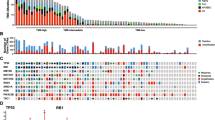Abstract
Merkel cell polyomavirus (MCV) is a recently discovered member of the polyomaviridae, a family of small DNA viruses that replicate in the nucleus of their host cell. MCV is one of at least 12 polyomaviruses that naturally infect humans, and furthermore one of four polyomaviruses that are known to cause severe human disease, predominantly in immunosuppressed or deficient individuals (DeCaprio and Garcea, Nat Rev Microbiol 2013;11(4):264–76; Korup et al., PLoS One 2013;8(3):e58021). Of these, MCV is of particular interest since it presently is the only human polyomavirus known to be involved in tumorigenesis. The virus was first identified in 2008 in tissue from Merkel cell carcinoma (MCC) by high throughput sequencing (Feng et al., Science 2008;319(5866):1096–100). Considerable evidence suggests that MCV is causally linked to MCC pathogenesis: Viral DNA is monoclonally integrated into the genome of the tumor cells in up to 90 % of all MCV cases, and the integrated MCV genomes furthermore harbor signature mutations that selectively abrogate viral replication while preserving cell cycle deregulating functions of the virus (Chang and Moore, Annu Rev Pathol 2012;7:123–44). Nonetheless, the development of MCC is doubtlessly a very rare complication of MCV infection, given that MCV is highly prevalent in the general population, with 44–80 % of adults displaying serum reactivity against viral antigens. What cells represent the natural reservoir of MCV infection in healthy individuals, whether the virus is potentially linked to human diseases other than MCC, and how precisely MCV infection contributes to cellular transformation during MCC pathogenesis are unresolved issues that are the subject of current research efforts.
Access this chapter
Tax calculation will be finalised at checkout
Purchases are for personal use only
Similar content being viewed by others
References
An P, Saenz Robles MT, Pipas JM. Large T antigens of polyomaviruses: amazing molecular machines. Annu Rev Microbiol. 2012;66:213–36.
Carter JJ, Daugherty MD, Qi X, Bheda-Malge A, Wipf GC, Robinson K, Roman A, Malik HS, Galloway DA. Identification of an overprinting gene in Merkel cell polyomavirus provides evolutionary insight into the birth of viral genes. Proc Natl Acad Sci U S A. 2013;110(31): 12744–9.
Chang Y, Moore PS. Merkel cell carcinoma: a virus-induced human cancer. Annu Rev Pathol. 2012;7:123–44.
DeCaprio JA, Garcea RL. A cornucopia of human polyomaviruses. Nat Rev Microbiol. 2013;11(4):264–76.
Feng H, Shuda M, Chang Y, Moore PS. Clonal integration of a polyomavirus in human Merkel cell carcinoma. Science. 2008;319(5866):1096–100.
Korup S, Rietscher J, Calvignac-Spencer S, Trusch F, Hofmann J, Moens U, Sauer I, Voigt S, Schmuck R, Ehlers B. Identification of a novel human polyomavirus in organs of the gastrointestinal tract. PLoS One. 2013;8(3):e58021.
Neumann F, Borchert S, Schmidt C, Reimer R, Hohenberg H, Fischer N, Grundhoff A. Replication, gene expression and particle production by a consensus Merkel Cell Polyomavirus (MCPyV) genome. PLoS One. 2011;6(12):e29112.
Pastrana DV, Wieland U, Silling S, Buck CB, Pfister H. Positive correlation between Merkel cell polyomavirus viral load and capsid-specific antibody titer. Med Microbiol Immunol. 2012; 201(1):17–23.
Paulson KG, Iyer JG, Tegeder AR, Thibodeau R, Schelter J, Koba S, Schrama D, Simonson WT, Lemos BD, Byrd DR, Koelle DM, Galloway DA, Leonard JH, Madeleine MM, Argenyi ZB, Disis ML, Becker JC, Cleary MA, Nghiem P. Transcriptome-wide studies of merkel cell carcinoma and validation of intratumoral CD8+ lymphocyte invasion as an independent predictor of survival. J Clin Oncol. 2011;29(12):1539–46.
Schowalter RM, Buck CB. The Merkel cell polyomavirus minor capsid protein. PLoS Pathog. 2013;9(8):e1003558.
Schowalter RM, Pastrana DV, Pumphrey KA, Moyer AL, Buck CB. Merkel cell polyomavirus and two previously unknown polyomaviruses are chronically shed from human skin. Cell Host Microbe. 2010;7(6):509–15.
Schowalter RM, Pastrana DV, Buck CB. Glycosaminoglycans and sialylated glycans sequentially facilitate Merkel cell polyomavirus infectious entry. PLoS Pathog. 2011;7(7):e1002161.
Schrama D, Peitsch WK, Zapatka M, Kneitz H, Houben R, Eib S, Haferkamp S, Moore PS, Shuda M, Thompson JF, Trefzer U, Pfohler C, Scolyer RA, Becker JC. Merkel cell polyomavirus status is not associated with clinical course of Merkel cell carcinoma. J Invest Dermatol. 2011;131(8):1631–8.
Schrama D, Ugurel S, Becker JC. Merkel cell carcinoma: recent insights and new treatment options. Curr Opin Oncol. 2012;24(2):141–9.
Sihto H, Kukko H, Koljonen V, Sankila R, Bohling T, Joensuu H. Merkel cell polyomavirus infection, large T antigen, retinoblastoma protein and outcome in Merkel cell carcinoma. Clin Cancer Res. 2011;17(14):4806–13.
Sihto H, Bohling T, Kavola H, Koljonen V, Salmi M, Jalkanen S, Joensuu H. Tumor infiltrating immune cells and outcome of Merkel cell carcinoma: a population-based study. Clin Cancer Res. 2012;18(10):2872–81.
Tolstov YL, Knauer A, Chen JG, Kensler TW, Kingsley LA, Moore PS, Chang Y. Asymptomatic primary Merkel cell polyomavirus infection among adults. Emerg Infect Dis. 2011;17(8): 1371–80.
Wieland U, Kreuter A. Merkel cell polyomavirus infection and Merkel cell carcinoma in HIV-positive individuals. Curr Opin Oncol. 2011;23(5):488–93.
Wieland U, Mauch C, Kreuter A, Krieg T, Pfister H. Merkel cell polyomavirus DNA in persons without merkel cell carcinoma. Emerg Infect Dis. 2009;15(9):1496–8.
Author information
Authors and Affiliations
Corresponding author
Editor information
Editors and Affiliations
Rights and permissions
Copyright information
© 2014 Springer Science+Business Media New York
About this chapter
Cite this chapter
Fischer, N., Grundhoff, A. (2014). Merkel Cell Polyomavirus. In: Yarchoan, R. (eds) Cancers in People with HIV and AIDS. Springer, New York, NY. https://doi.org/10.1007/978-1-4939-0859-2_8
Download citation
DOI: https://doi.org/10.1007/978-1-4939-0859-2_8
Published:
Publisher Name: Springer, New York, NY
Print ISBN: 978-1-4939-0858-5
Online ISBN: 978-1-4939-0859-2
eBook Packages: Biomedical and Life SciencesBiomedical and Life Sciences (R0)




